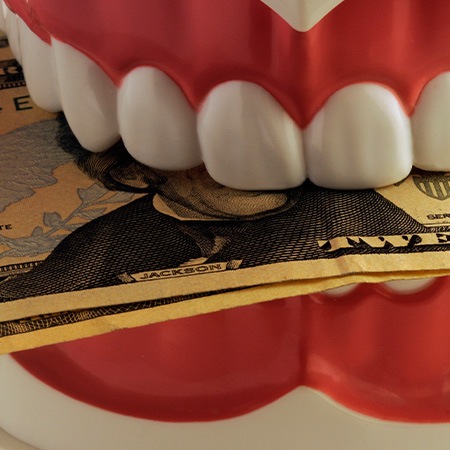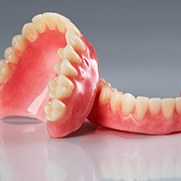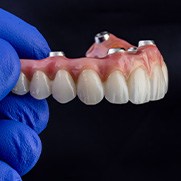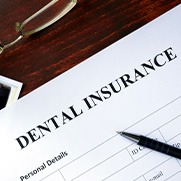Dentures – Fresno, CA
Don’t Let
Missing Teeth Define Your Life
A distressingly high number of Americans – around 40 million – have lost all of their natural teeth, making it extremely difficult for them to eat most foods, speak with any sort of clarity, or even just smile at friends and loved ones. Even those that still have some teeth remaining are likely to encounter difficulties in their everyday life. At Sakinawa Dental, our modern personalized dentures give you an easy way to replace multiple missing teeth so that you can live a normal life again. Call us today to set up an appointment and learn more.
Why Choose Sakinawa Dental for Dentures?
- Dental Implants Placed and Restored Under One Roof
- Dentures Made of Comfortable, Lifelike Materials
- Technologically Enhanced Treatment Planning
Who’s a Good Candidate for Dentures?

Dentures are a popular and effective choice for replacing missing teeth. Because of their flexibility and adaptability, almost anyone who has lost multiple teeth or even a full arch can have their smile restored! The best news is that these prosthetics allow patients to speak, eat, and smile confidently again, vastly improving their quality of life.
Whether you're missing several teeth due to injury, decay, or gum disease, our team at Shinkawa Dental will carefully evaluate your needs and explore your options. If you want to get a head start before your consultation and learn more about denture candidacy, continue reading below!
Effects of Missing Teeth

Your smile, for good or ill, can have a big effect on your well-being both physically and mentally. For example, over time, gaps left by missing teeth can cause neighboring teeth to shift, leading to misalignment and bite problems. Tooth loss can also open the door for bone loss in your jaw, and facial sagging.
All of this can affect your speech and appearance as well, lowering self-esteem, and possibly causing anxiety. Fortunately, dentures provide an excellent way to prevent these issues by restoring both the functionality and the appearance of your smile, ensuring you maintain your oral health and confidence.
What Are the Qualities of a Great Candidate for Dentures?

So, what does a great candidate for dentures look like? What qualities should they have? You may be surprised to see that these prosthetics can help a wide variety of people, and aren’t restricted to an age group. A great candidate for dentures typically has:
- Multiple missing teeth or loss of a full dental arch
- Healthy gums and enough jawbone to support the prosthetics
- A commitment to maintaining oral hygiene and care for the dentures
- The willingness to adapt to a learning curve as they get used to wearing dentures
- The need for an affordable and complete treatment
Alternative Tooth-Replacement Options

While dentures are a fantastic solution for many, they aren't the only tooth-replacement option available. Alternatives include:
- Dental Implants: A long-lasting option where titanium posts are surgically placed into your jawbone, providing a stable base for various restorations like crowns or even special denture prosthetics!
- Dental Bridges: Bridges are ideal for replacing one or a few missing teeth in a row by attaching fused artificial teeth called pontics to adjacent natural teeth.
At Shinkawa Dental, we want every patient to know that they have options for tooth replacement. Our expert dental team will work with you to find the solution that best fits your lifestyle, budget, and oral health needs. So, don’t hesitate to reach out to us and schedule your consultation today!
Types of Dentures

The dentures of today aren’t the same as the prosthetics that people used decades ago. The materials used to make them are more lifelike, and the overall design is less bulky and focused on personal comfort as well as stability. Furthermore, there are several kinds of dentures that you can choose from based on your unique situation. We will recommend one of the three types of dentures listed below depending on what we find during your first consultation.
Partial Dentures
Partial dentures can be used in minor cases where only a couple of teeth are missing as well as more extensive cases where there are multiple gaps throughout the mouth. The prosthetic is held in place with a metal clasp that is attached to the natural teeth.
Full Dentures
A full denture replaces a whole row of teeth. If you have lost most of your teeth and don’t have enough worth salvaging, the remaining teeth can be extracted to make room for a prosthetic. Full dentures can be held in place with natural suction, but specialized adhesives are available if you feel you need them.
Implant Dentures
We can anchor your dentures to dental implants that have been inserted directly into your jawbone. There will be no need to rely on natural suction or separate metal clasps; the prosthetic will have “roots” to keep it stable at all times. Most implant dentures are designed so that they’re permanently anchored in place, but they can be made to be removable if you choose.
The Benefits of Dentures

Have you ever wondered why dentures have remained popular for all these years? Well, there isn’t just one reason – there are several! Below, you’ll learn a few of the many reasons this tried-and-true tooth-replacement solution is loved by dentists and patients alike.
Varied Diet

Whether you are missing a few of your molars or an entire arch of teeth, you know first-hand how difficult it can be to eat a varied, well-balanced diet. In fact, following tooth loss, you might have resorted to only eating soft foods, like yogurt, applesauce, and soup. Fortunately, dentures are crafted from high-quality dental materials, which look great and are extremely durable. In other words, they restore your bite strength so that you can chew many different foods again.
Custom-Made for Each Patient

Since no two smiles are the same, no two dentures are the same! Everything from the gum-colored base to the number of replacement teeth and their appearance are custom-made with your specific face shape and aesthetic goals in mind. That way, your restoration doesn’t feel bulky or protrude unnaturally. Instead, it will look great, feel natural, and function perfectly.
10+ Year Lifespan

Another perk: dentures can last for well over a decade with proper care! Don’t worry – that doesn’t require a complex oral hygiene regimen and a cabinet full of special oral hygiene products either. Simply clean them with a soft-bristled toothbrush and non-abrasive toothpaste every morning and night. Additionally, soak them in a dentist-recommended cleaner while you sleep and make sure to take good care of any remaining natural teeth you have.
Clearer Communication

Unfortunately, even one missing tooth can have a negative impact on your speaking patterns, making it difficult to enunciate clearly and communicate with others. Rest assured, dentures can help. By filling in the spaces in your smile (or providing you with an entirely new set of teeth), they can improve everything from your self-esteem to your speaking patterns. Of course, there will be a slight learning curve at the beginning, but you’ll adjust in no time with practice!
Prevents Dental Drift

Have you heard of dental drift? It refers to when the teeth surrounding the gap begin to drift out of position. It may not seem like much of an issue, but it can actually impact the look, health, and function of your smile, which is one of the many reasons we recommend exploring your tooth-replacement options sooner rather than later. Fortunately, partial dentures can fill the open space, preserving the alignment of your bite in the short and long term.
Understanding the Cost of Dentures

Before you actually get dentures, you’ll want to confirm their price. It only makes sense to learn whether the treatment would fit your budget. Still, the cost of dentures varies by patient; you’ll need to consult our dentists for an estimate. We’ll also do our utmost to make your care affordable, walking you through cost factors, dental insurance, and more. Get further details by reading below or by calling our office soon.
Factors That Affect the Cost of Dentures

As part of your consultation, we’ll assess the factors that affect your denture’s cost. These include:
- Preparatory Services – There’s a chance you’ll need additional dental work (tooth removal, gum disease therapy, etc.) before denture treatment. In that case, you’ll have to pay more.
- Denture Base Materials – Most denture bases are made of acrylic, but this material comes in different kinds. The type used for your restoration will raise or lower your treatment cost.
- Replacement Teeth Materials – In general, a denture’s teeth are either acrylic or porcelain. Acrylic ones don’t cost much, while porcelain kinds can be expensive.
Aside from the points above, note that lower-priced dentures use poor materials. It’s best to buy more moderately priced ones to ensure high quality.
Are Implant Dentures More Expensive?

Implant dentures are pricier than standard ones, but their higher cost is justified. These restorations offer great perks you won’t find elsewhere.
You see, implant dentures rely on dental implants – metal posts set in your jaw. Since those posts fuse with your jawbone, they ensure your new teeth don’t slip around or fall out. That means your final restoration will remain stable and secure for many years. Combined with their lifelike looks, this result is priceless.
Another relevant detail is that implant dentures are great investments. Because their posts can last 30 years (with proper care), they don’t need as much repair or replacement work as other options. The treatment could save you money otherwise spent on follow-up appointments.
Does Dental Insurance Cover Dentures?

Dental insurance usually covers dentures. Since most plans see these replacement teeth as crucial, they’ll match 50% of a denture’s cost. You just need to meet your deductible or maximum first.
All that said, there are exceptions. Your own dental plan may have limited or non-existent denture coverage. That being the case, please confirm your benefits before getting treatment. Our dental team will even help you connect with your plan provider if necessary.
Other Options for Making Dentures Affordable

Whether you have dental insurance or not, dentures can still be affordable. You just need to rely on our practice’s helpful payment options! With the right one, your new teeth will be budget-friendly.
Here at Shinkawa Dental, we offer:
- Dental Membership Plans – By paying an annual fee, you can join our practice’s dental membership plan. This setup would give you a 15% discount on dentures.
- Flexible Financing Program – Our office is proud to work with Sunbit and CareCredit. Through these 3rd party financiers, you could pay for dentures in manageable monthly installments.
Dentures that restore your smile don’t need to drain your bank account. If you visit us, we’ll help you finance treatment so the cost fits your situation.
Dentures Aftercare

If you want to make sure that your dentures last as long as possible, you’ll need to take the proper steps to keep them healthy and damage-free. While the average lifespan of removable dentures is 5-7 years, All-on-4 can remain in place for 30+ years! By following the guidelines provided below, you’ll continue to enjoy a beautiful, functional, and healthy set of teeth year after year.
Removable Dentures
When wearing removable dentures, it’s important that you recognize their need to be cleaned regularly. Bacterial accumulation can wreak havoc on more than just your artificial teeth. They can also cause problems for your overall health. Our team will provide detailed instructions on what you can do to make sure your dentures are properly maintained.
Remove After Eating
Once you are finished with your meal, remove your dentures and give them a thorough rinse. This helps remove any existing food and debris that may remain. Also, if possible, go ahead and clean your mouth (i.e., gums and natural teeth) to prevent additional bacteria and food particles from transferring onto your dentures.
Clean Your Restoration
There are two times each day that you should clean your dentures: in the morning and at night. Using a soft-bristled toothbrush or denture-specific brush, lukewarm water, and nonabrasive toothpaste, you can clear away anything that might try to break down your prosthesis or natural smile. Just remember never to rinse or clean them with hot water, as this will warp the materials, effectively damaging your teeth.
Keep Your Dentures Safe
There are a few key points that are necessary if you want to keep your dentures safe from possible damage or loss. First, place something soft in your sink while cleaning your prosthetic. If they slip out of your hands, they will not crack against the hard porcelain. Second, if you live with or are visiting a home with children and pets, keep your dentures out of reach.
Remove Dentures When You Sleep
Before going to bed, make sure to remove your dentures and allow them to soak in a specific denture cleaner. This is the most effective way to give them a good cleaning while also allowing your mouth to rest and relax after a full day. The continuous pressure placed on your gums and bone from your dentures can be overwhelming. Nighttime gives these facial structures a break, allowing them to breathe and take in nutrients lost throughout the day.
Notice Changes
Facial changes are to be expected while wearing dentures. As you experience jawbone resorption because of the lack of stimulation provided by dental implant posts, your teeth may no longer fit as comfortably as before. When this happens, schedule an appointment with our office to discuss whether a reline or replacement is required.
All-on-4 Dentures
These prosthetics are anchored to titanium posts that are placed within your jawbone, so they cannot be removed. As a result, you’ll keep them clean just as you do your natural teeth. Brushing twice a day for two minutes, flossing, and rinsing with an ADA-approved mouthwash will clear them of harmful bacteria while also keeping any natural teeth clean and cavity-free. Along with at-home oral hygiene habits, though, you’ll also need to make sure you keep up with routine dental checkups and cleanings at our Fresno office
How Dentures Are Made

Part of appreciating the beauty and benefits of your new dentures is understanding the process of making them. The truth is a lot goes into restoring your smile. Whether you need a full or partial denture, here’s what your new teeth go through before they’re ready for their closeup!
What Are Dentures Made Of?

Your dentures are made of two equally important parts: the base and the teeth. Here’s a closer look at each component:
- Denture Base: The denture base is the foundational structure of your prosthetic that holds the teeth in place. It can be made of a variety of materials, including acrylic, nylon, porcelain, resin or metal. Typically, full dentures are made of acrylic because they can be tailored to match the color of your natural gum tissue. Partial dentures may use metal clips with an acrylic base. Sometimes nylon may be used instead of acrylic.
- Artificial Teeth: The artificial teeth in your denture are often made from materials like resin or porcelain because of their natural appearance. However, porcelain is the most popular option because it not only looks but feels natural, too. It is also extremely durable. Unfortunately, however, it can be abrasive to your natural teeth, so is typically only used in full dentures.
The Denture Creation Process

Because each and every denture is custom made for the patient’s mouth, creating them is a multi-step process. Here’s a step-by-step look at what it typically looks like:
- Step 1: Your dentist will first need to take impressions of your upper and lower gums using a thick paste. This is used to create a plaster model that is essentially a replica of your mouth. It is used to ensure that your final denture is the correct size and shape. Your dentist may also take measurements of your jaw to ensure the best fit.
- Step 2: The cast is then sent to a dental laboratory where your new dentures will be made. The lab will use it to create a wax version of your gum line.
- Step 3: Next, the artificial teeth will be set into place. Using a mechanical device called an articulator, the teeth will be attached with wax. The technician will then make minor adjustments by shaping and carving the wax to ensure that it looks like your gums. This will be used to make your finished dentures.
- Step 4: After this step, your wax dentures will be sent back to Shinkawa Dental for you to try them on. Once approved, your dentist will return them to the lab for completion.
- Step 5: Back at the lab, a technician will boil the dentures and remove any wax portions. They will then be placed in a flask which acts as a holding device for the plaster to be poured into to maintain the shape of your dentures. Then, the flask is placed into hot water to melt them.
- Step 6: Next, holes are made in the teeth so that the material can attach. A liquid separator is added to the plaster layer to prevent the acrylic from sticking to it. Acrylic then is inserted into the flask to replace the wax.
- Step 7: Now the plaster can be carefully removed using special lab tools, revealing your new denture. It will then be placed in an ultrasonic bath where any remaining plaster will be removed.
- Step 8: If there is any excess acrylic, it will be cut from the denture. Following this step, it will be polished to perfection and sent back to Shinkawa Dental!
- Step 9: Once it arrives here, we will have you return to the office for a fitting. If adjustments are needed, they will be done at this stage. If all is well, you can wear them home and begin enjoying your new dentures immediately!
Adjusting to Your New Dentures

Once you receive your new dentures, it is normal to feel some discomfort at first. Initially, you may experience mild soreness and have difficulty speaking and eating. Over time, your mouth will adjust to your new prosthetics, and they will feel very similar to your natural teeth. You can easily speed up the adjustment process by eating a soft diet, practicing speaking, and even experimenting with denture adhesive.
If any discomfort persists, reach out to Shinkawa Dental, as further adjustments may be necessary.
Denture FAQs
How Long Will You Have to Wait to Get Dentures After Your Teeth are Pulled?
Typically, the wait between your tooth extraction and your new dentures is about six to eight weeks; however, the exact amount of time will depend upon the type of denture you will be receiving.
Waiting allows your gums a chance to heal and provides additional time to ensure that your dentures fit properly.
Immediate (same day) dentures can be placed on the same day as your extraction. This allows you to begin wearing your new teeth sooner, however it will not allow your dentist the opportunity to preview the fit first. This can occasionally be problematic, as the shape of the underlying bone and gums may change as your mouth heals.
If you’re receiving implant dentures, you will need to wait between four and six months for the implant to complete the osseointegration process.
Can I Reline My Dentures Myself?
Social media has made a lot of things possible in recent years, including many of people attempting to reline their dentures at home. The belief is that you can repair them yourself to both save some money and ensure a better fit. In fact, you can even buy DIY denture reliner kits at many stores and online.
Unfortunately, however, relining your own dentures is usually a bad idea. Only a qualified dentist can determine the best way to fix your dentures, and if you’re not careful, you can make them fit worse. If done incorrectly, you can even make it painful and difficult to chew with your dentures.
Can I Sleep with My Dentures?
While you will be instructed to keep your dentures on for 24 hours when you first receive them, you should remove them every evening after that. This is because wearing them restricts the circulation in your gums, which can cause soft tissue irritation and can accelerate ridge resorption. Removing them allows your gums a chance to recover and get the nutrients they need while you sleep.
Furthermore, the dark moist area underneath your dentures is an ideal place for bacteria to thrive. Because of this, sleeping with dentures has been tied to an increased risk of pneumonia. Failure to remove them can also increase gum and tongue plaque, which can cause gum disease and damage to any remaining natural teeth.
Can I Use Regular Toothpaste to Clean My Dentures?
While you do need to brush and rinse your dentures daily, you should not do this with regular toothpaste. Toothpaste is abrasive and can leave microscopic scratches on the surface of your dentures, which over time can cause serious damage. Instead, it is recommended that you use hand soap or mild dishwashing detergent and denture cleanser and be sure to clean them well after every meal. Also, be sure to use a soft-bristled toothbrush to avoid scratching them.
